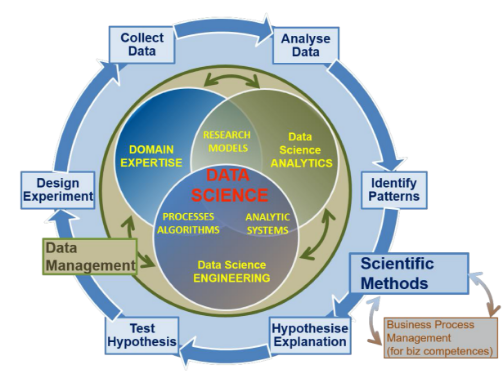UK CREDIT RATED QUALIFICATION
Postgraduate Diploma in Data Science
The Postgraduate Diploma Data Science is a full programme covering the key skills and knowledge needed by data scientists to develop insights and solutions across a wide range of industries and domains.
SOME OF THE ORGANISATIONS OUR GRADUATES WORK AT












COURSE MODE AND DURATION
Full Time/Part Time Online
complete within 9 months
complete within 9 months
COURSE FEES
60 ECTS CREDITS
What skills and knowledge will I gain?
The Postgraduate Diploma in Data Science has been developed by practising data scientists with experience working with major international firms across a wide range of industries. They have identified key skills required for data scientists and have also ensured the course content conforms to the Edison European Data Science Framework’s Body of Knowledge (BoK-DS).
This course is credit-rated at postgraduate level on the European Qualifications framework and carries 60 ECTS credits, which can be transferred to the Institute’s MSc in Data Science and other master's degree programmes.

Key Skills and Knowledge
-
R and Python programming skills
-
Data management
-
Descriptive and inferential statistics
-
Data visualisation
-
Hypothesis testing
-
Analysis of variance
-
Predictive analytics
-
R and Python programming skills
-
Advanced predictive modelling
-
Time Series Analysis
-
Supervised and unsupervised learning
-
Machine learning algorithms
-
Text mining and natural language processing
Tools and Languages





What you will learn on the course
You are provided with highly structured and detailed course content, broken down into ten distinct modules covering core skills and knowledge through our learning management system. While the course is self paced, tutors are on hand to provide support and feedback for your exam prep and project work.
Postgraduate Diploma Modules
MODULE 1
Exploratory Data Analysis
Most industry analysis starts with exploratory data analysis and a thorough study of this will help you to perform data health checks and provide initial business insights. You will gain a sound understanding of Python and R programming, descriptive statistics, data management and data visualisation. You will also learn SQL for big data pre- processing and prepare data for big data analytics. The module serves as an essential foundation for advanced analytics taught later in the course.
-
Programming basics in Python and R
-
Data management
-
Measures of central tendency and variation
-
Bivariate relationships
-
Data visuallsation
MODULE 2
Statistical Inference
Statistical inference is the process of drawing inferences or conclusions from data using statistical techniques. This is at the core of data science, and a strong understanding of statistics from the beginning is the prime ingredient for a competent data scientist. In this module, you will cover sampling, statistical distribution, hypothesis testing, and variance analysis and use R code to carry out various statistical tests and draw inferences from their output.
-
Principles of statistical inference
-
Parametric tests
-
Non-parametric tests
-
Analysis of variance (ANOVA)
MODULE 3
Fundamentals of Predictive Modelling
Solutions to many business problems are related to successfully predicting future outcomes. This module introduces predictive modelling and provides a foundation for more advanced methods and machine learning. You’ll gain an understanding of the general approach to predictive modelling and then build simple and multiple linear regression models in Python and R and apply these in a range of contexts.
-
Predictive modelling principles
-
LInear regression models
-
Model validation
-
Python and R packages for predictive modelling
MODULE 4
Advanced Predictive Modelling
In this module, you are introduced to model development for categorical dependent variables. Binary dependent variables are encountered in many domains such as risk management, marketing and clinical research and this module covers detailed model building processes. Multinomial and ordinal logisitic regression are also covered.
-
Logistic regression models
-
Survival analysis
-
Cox regression
-
Poisson regression
MODULE 5
Time Series Analysis
In this module, time series forecasting methods are introduced and explored. You will analyse and forecast macroeconomic variables such as GDP and inflation, as well as look at complex financial models using ARCH and GARCH, ARIMA, time series regression, exponential smoothing and other models.
-
Time series concepts
-
Assessing stationarity
-
ARIMA, ARCH, GARCH modelling
-
Panel Data Regression
MODULE 6
Unsupervised Multivariate Methods
Data reduction is a key process in data science and you will learn to apply data reduction methods such as principal component analysis, factor analysis and multidimensional scaling. You will also learn to segment and analyse large data sets using clustering methods, another key analytical technique that brings out rich business insight if carried out skillfully.
-
Principal Component Analysis
-
Factor Analysis
-
Multidimensional Scaling
-
Cluster Analysis
MODULE 7
Machine Learning 1
Machine learning algorithms are new generation algorithms used in conjunction with classical predictive modelling methods. In this Machine Learning 1 module, you will understand applications of the support vector machine, K nearest neighbours and naive bayes algorithms for classification and regression problems using case studies from a range of industries and sectors.
-
Naive Bayes Method
-
Support Vector Machine Algorithm
-
K nearest neighbours
MODULE 8
Machine Learning 2
The Machine Learning 2 module continues developing your machine learning knowledge and you will cover decision tree, random forest and neural network algorithms for regressionand classification, again drawing on case studies from real world data. You will have the opportunity to compare the performance of machine learning algorithms against classical statistical models and learn to assess which are most appropriate for specific scenarios.
-
Decision Tree
-
Random Forest
-
Association Rules
-
Neural Networks
MODULE 9
Text Mining and Natural Language processing
This module looks at analysing unstructured data such as that found social media, newspaper articles, videos and more. In particular you will look at methods for text mining and natural language processing using R and Python code to produce graphical representations of unstructured data and carry out sentiment analysis.
-
Structured vs unstructured data
-
Text mining in R and Python
-
Text mining using ggplot2
-
Sentiment analysis using R and Python
MODULE 10
Data Science in Practice
The Data Science in Practice module provides you with an opportunity to yor apply knowledge through project work. You will select a project from a specific domain and appropriately apply exploratory data analysis, statistical methods and select appropriate advanced modelling techniques. This module also develops your scientific communication skills through the preparation of project reports and presentations.
-
Presentation and communication skills
-
Synthesis of data science knowledge
-
Application to real world data and scenarios
Who is the course for?
The Postgraduate Diploma in Data Science is an advanced qualification suitable for graduates with a degree or equivalent in a numerate discipline from a recognised institution. It is suitable for both those wishing to move into the data science field and experienced data science professionals alike.

Career changers
Those wishing to change careers and transition to data science and analytics

Experienced Data Analysts
Experienced data analysts looking to move into a data scientist role

Data Scientists
Practising data scientists looking to confirm and extend their skills

Graduates with experience
Graduates from numerate disciplines including business and finance, computing, economics, the sciences, social sciences

Managers and Leaders
Managers and leaders seeking to gain a technical understanding of data science and its role in business and organisations

Advanced Degree Holders
Master’s and PhD graduates from other disciplines
How do I progress with the Postgraduate Diploma in Data Science?
Holders of the Postgraduate Diploma in Data Science can progress to the Data Science Institute’s MSc Data Science. They may also combine their professional experience with the Postgraduate Diploma to achieve the institute’s Certified Professional Data Science certification.


Professional Certificate in
Data Science
30 ECTS credits

*1 year minimum professional
experience
experience

Certified Professional
Data Analyst CPDA
Data Analyst CPDA
Postgraduate Diploma in
Data Science
60 ECTS credits

*2 years minimum professional experience

Certified Professional
Data Scientist CPDS
Data Scientist CPDS
MSc. Data Science
90 ECTS Credits

*3 years plus experience in technical leadership or strategic roles

Fellow of the
Data Science Institute FDSI
What are employment opportunities will I have?
Holders of the Postgraduate Diploma in Data Science will find opportunities in data scientist roles across a wide range of sectors. Data Science and analytics is central to
AI, machine learning, robotics and forecasting, and is used across a wide array of industries and professional functions such as those listed below:
-
Pharmaceuticals
-
Sports
-
Marketing
-
Education
-
Manufacturing
-
Agriculture
-
Utilities
-
Healthcare
-
Healthcare
-
Human Resources
-
Telecommunications
-
Banking and Finance
-
Academia
-
Insurance
-
Big Tech
-
Aerospace
-
Aerospace
-
Logistics
-
Environmental management
-
Cybersecurity
-
Engineering
-
Medical Technology
How is the course delivered?
Our unique, hands-on learning experience combined with our interactive learning platform and industry case studies, real worlds data sets, project based assessment led by expert instructors and tutor support allows learners to build their knowledge and practice applying it before bringing it into a professional setting.
Interactive Learning Platform
Progress through the course using our highly structured, comprehensive learning content with 100s of video lessons, lecture slides, and quizzes

Case Studies
Learn from case studies, examples and datasets from actual companies produced by data science professionals.

Live Online Classes
Regular scheduled classes delivered by practising data scientists and webinars from industry professionals

Build a portfolio
Carry out project work based on real world scenarios and data sets and build a portfolio to support you at work or improve your employability

Exam practice
Comprehensive practice questions and guidance to help you prepare for every module of your course exams

Expert Tutor Support
Expert tutors are on hand to guide you through the course, prepare you for exams and support your project work
Some numbers….
250K
Shortage of data scientists
In the United states a study by Quanthub in 2020 estimated that there was a shortage of 250,000 data scientists in the USA alone
10K+
Open positions in UK/Ireland
Indeed.com/glassdoor/Linkedin job openings with figures 10,000 + data science and analyst open positions in UK and Ireland (January 2022)
No. 1
Data Scientist/Analyst
According to the World Economic Forum report 2020 - fastest growing job roles- 1. Data Scientists and Analysts 2. Machine Learning Engineers 3. Big Data Specialists
See what our students say about us
Mohammed Hamad
Analytics Lead
DXC Technologies
“The course is very strong technically and the support was excellent”
Jehad Mossa
Senior Manager
PWC
“The overall course programme is very complete and I developed my data science knowledge substantially”
Manuel Tanpoco
(Ed.D, MBA)
Professor of Mathematics La Salle University
“As a mathematician and lecturer, I was impressed with the course content and explanation of the statistical methods and algorithms. I also benefited greatly from learning Python and R”
Mohammed Hamad
Analytics Lead
DXC Technologies
“The course is very strong technically and the support was excellent”
Jehad Mossa
Senior Manager
PWC
“The overall course programme is very complete and I developed my data science knowledge substantially”
Manuel Tanpoco
(Ed.D, MBA)
Professor of Mathematics La Salle University
“As a mathematician and lecturer, I was impressed with the course content and explanation of the statistical methods and algorithms. I also benefited greatly from learning Python and R”
Start Your Application
Please complete this initial application form and one of our admissions team will get in touch with you to discuss the next steps in the application process.
Fees £4250 £2650
Enrol by March 29th to receive a 36% discount on the full published fee!
Enrol by March 29th to receive a 36% discount on the full published fee!
DATA SCIENCE INSTITUTE
Phone: +353 21 204 0519
Whatsapp: +353 89 973 5641
-
About the Data Science Institute
-
Accreditation and Recognition
-
Partners
-
Our people
-
Privacy
-
Term & conditions
-
Waterfront Square, 1 Horgan's Quay,, Cork, T23 PPT8
PROFESSIONAL CREDENTIALS
DATA SCIENCE COURSES
RESOURCES
Download Diploma Brochure
Download Certificate Brochure
Find out about our Certifications
Postgraduate Diploma in Data Science
ENROLLING FOR MARCH 2022
1950
Download Masters Brochure
Download Pg Diploma Brochure
Do not miss!
Great offer today!
50% OFF - Describe your offer here... - Use promo code #YYY
